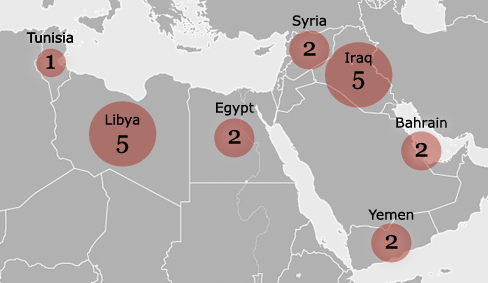Attacks on the Press in 2011 - Bahrain
| Publisher | Committee to Protect Journalists |
| Publication Date | 22 February 2012 |
| Cite as | Committee to Protect Journalists, Attacks on the Press in 2011 - Bahrain, 22 February 2012, available at: https://www.refworld.org/docid/4f4cc99623.html [accessed 5 June 2023] |
| Disclaimer | This is not a UNHCR publication. UNHCR is not responsible for, nor does it necessarily endorse, its content. Any views expressed are solely those of the author or publisher and do not necessarily reflect those of UNHCR, the United Nations or its Member States. |
Key Developments
-
Press freedom conditions hit their worst point since Bahrain gained its independence in 1971.
-
Two journalists die in state custody; widespread arrests, assaults, detentions are reported.
The government waged a brutal multifaceted crackdown against independent news media covering the country's months-long protest movement. Security forces subjected journalists to assaults, expulsions, detentions, politicized trials, prison terms, and lethal mistreatment in custody. Both international and local reporters were targeted: A journalist for the U.S. broadcaster ABC was beaten and his camera was confiscated in February; a photographer for the independent domestic daily Al-Wasat was beaten while covering a March protest. Authorities used live ammunition against protesters and reporters: The New York Times reported that two of its journalists came under helicopter fire in February. The Ministry of Information expelled CNN correspondent Mohammed Jamjoom over coverage of the unrest, and detained members of a CNN crew trying to interview human rights activist Nabeel Rajab. In June, a court convicted two critical journalistic bloggers on a series of antistate charges and sentenced them to lengthy terms. Reports of torture and mistreatment of detainees were common: Two journalists, one a founder of Al-Wasat, died in government custody under circumstances authorities would not fully explain. Al-Wasat, the country's premier independent paper, was in the crosshairs throughout the year: Armed assailants stormed its printing facility in March; the Information Ministry briefly shut the paper in April; and the government filed criminal charges against three senior editors for "false news" the same month. CPJ honored Al-Wasat founder and editor Mansoor al-Jamri with its 2011 International Press Freedom Award.
[Refworld note: The sections that follow represent a best effort to transcribe onto a single page information that appears in tabs on the CPJ's own pages, which also include a number of graphics not readily reproducible here. Refworld researchers are therefore strongly recommended to check against the original report: Attacks on the Press in 2011.]
Killed in 2011: 2
Zakariya Rashid Hassan al-Ashiri and Karim Fakhrawi were the first media fatalities CPJ recorded in Bahrain since the organization began keeping detailed data in 1992. Both died in government custody. Al-Ashiri, a critical blogger, died a week after his arrest on charges of disseminating false news. The government cited complications from sickle cell anemia, an assertion disputed by al-Ashiri's family. Fakhrawi, a founder of Al-Wasat, died in state custody three days later. The government pinned his death on kidney failure, but photographs published online showed a body identified as that of Fakhrawi with extensive cuts and bruises, CPJ research shows.
Media fatalities in the region in 2011:

Imprisoned on December 1, 2011: 1
Online journalist Abduljalil Alsingace was serving a life sentence on antistate charges when CPJ conducted its annual prison census. A fellow online journalist, Ali Abdel Imam, was convicted in absentia on similar charges. In September, an appeals court upheld their sentences.
Arrests, threats, harassment: 92
Since civil unrest began on February 14, at least 92 local journalists endured arrests, threats, and harassment, according to the Bahrain Center for Human Rights.
Breakdown of those targeted:
46: Print journalists
22: Photographers
15: Internet reporters
9: Radio, television journalists
Expulsions, denials of entry: 20
Intent on silencing international coverage of the unrest, authorities blocked numerous journalists from entering the country and expelled or deported others, CPJ research shows.
A record of obstruction:
17 : Journalists denied entry. News outlets included the BBC, CNN, McClatchy Newspapers, and CBS
1: Journalist from CNN expelled
2: Journalists from Al-Wasat deported
Short-term detentions: 19
Several international and local journalists were detained for days or weeks for their coverage of civil unrest, CPJ research shows.
Detentions reflect a spring crackdown:
7: Detained in March
2: Detained in April
10: Detained in May
